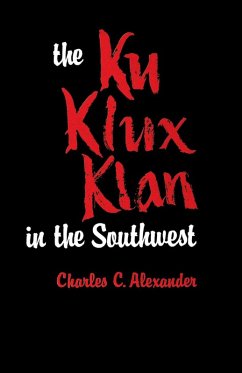A study of the career of the KKK and its appeal in Texas, Louisiana, Oklahoma, and Arkansas in the early twentieth century. This is a study of a disturbing phenomenon in American society-the Ku Klux Klan-and that eruption of nativism, racism, and moral authoritarianism during the 1920s in the four states of the Southwest-Texas, Louisiana, Oklahoma, and Arkansas-in which the Klan became especially powerful. The hooded order is viewed here as a move by frustrated Americans, through anonymous acts of terror and violence, and later through politics), to halt a changing social order and restore familiar orthodox traditions of morality. Entering the Southwest during the post-World War I period of discontent and disillusion, the Klan spread rapidly over the region and by 1922 its tens of thousands of members had made it a potent force in politics. Charles C. Alexander finds that the Klan in the Southwest, however, functioned more as vigilantes in meting extra-legal punishment to those it deemed moral offenders than as advocates of race and religious prejudice. But the vigilante hysteria vanished almost as suddenly as it had appeared; opposition to its terrorist excesses and its secret politics led to its decline after 1924, when the Klan failed abysmally in most of its political efforts. Especially significant here are the analysis of attitudes which led to this revival of the Klan and the close examination of its internal machinations. "The Ku Klux Klan is not a single phenomenon. It is three different organizations, which sprang up three different times, for three different reasons. Charles Alexander focuses this study-and it's a good one-on the middle Klan, the so-called Invisible Empire extending from 1915 to 1944, flourishing in the mid-twenties with a membership estimated at 5 million, at one time or another dominating to some degree politically every city in the Southwest.... A forthright and definitive account, to be read along with David Chalmers's recent Hooded Americanism... for the complete national picture." -Kirkus Reviews
Dieser Download kann aus rechtlichen Gründen nur mit Rechnungsadresse in A, B, BG, CY, CZ, D, DK, EW, E, FIN, F, GR, HR, H, IRL, I, LT, L, LR, M, NL, PL, P, R, S, SLO, SK ausgeliefert werden.









